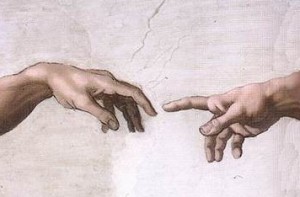 In my book Science Was Born of Christianity: The Teaching of Fr. Stanley L. Jaki, I used the word “veto” in the introduction. Like this: “To understand this claim is to understand why the Catholic Church has a legitimate right and authority to veto scientific conclusions that directly contradict divinely revealed dogma.”
In my book Science Was Born of Christianity: The Teaching of Fr. Stanley L. Jaki, I used the word “veto” in the introduction. Like this: “To understand this claim is to understand why the Catholic Church has a legitimate right and authority to veto scientific conclusions that directly contradict divinely revealed dogma.”
That word “veto” in the same sentence as “legitimate right and authority” and “science” and “dogma” seems to confound atheists. It’s like they hear, “The Church is trying to restrict science! Those awful Catholics would burn people if they could get away with it!”
Legitimate Right and Authority to Veto
The word “veto” means to refuse to consent to or to refuse to accept. For instance, if my daughter says she thinks cats have nine-lives, then I, as her mother, have the “legitimate right and authority” to refuse to consent to or accept that conclusion. 1) As her guardian I am obligated to teach her the truth. 2) I know a fuller truth about living things than she does. I can veto that conclusion. I can say, “No, cats do not have nine-lives; they only have one.” I can offer an explanation. The word “legitimate” refers to genuine (real) as opposed to spurious (fake). It also refers to lawfulness and hierarchy, thus “rights” and “authority.”
The Christian Creed and de fide dogma contain the truths revealed by God. The Church guards those truths for her children, like a mother. The Catholic Church has always vetoed heresy, as evidenced in the rich intellectual tradition of writings that defend against false conclusions. As Gilbert K. Chesterton poetically wrote of the “thrill of orthodoxy:”
To have fallen into any of those open traps of error and exaggeration which fashion after fashion and sect after sect set along the historic path of Christendom— that would indeed have been simple. It is always simple to fall; there are an infinity of angles at which one falls, only one at which one stands. To have fallen into any one of the fads from Gnosticism to Christian Science would indeed have been obvious and tame. But to have avoided them all has been one whirling adventure; and in my vision the heavenly chariot flies thundering through the ages, the dull heresies sprawling and prostrate, the wild truth reeling but erect. (end of Chapter VI, Orthodoxy)
People who find “the wild truth” troubling usually have one or both of these misunderstandings: 1) They do not understand the limits of science and extend it beyond material objects and quantities because, by rejecting God, science has become their only source of truth. 2) They have an antagonistic preconception of dogma and orthodoxy, of authority altogether.
What Scientific Conclusions are We Talking About?
The so-called scientific conclusions aren’t actually scientific anything. They are ideologies grafted onto science. The modern confusions mostly concern the denial of the human soul and freedom of human persons, the eternity of time and immortality of man as robot, and the existence of God. (The links are but a few examples.) Whenever a scientist concludes that science proves there is no soul, that humans do not have free will, that science will make man immortal, that time has no beginning or end, or that God does not exist, the Church will not accept those materialistic, atheistic conclusions. Those ideas are not scientific. More importantly, they contradict revealed truth and, in doing so, they are dehumanizing.
Unfortunately people do think those questions are matters of science today, which is why it is critical for the limits of science to be clarified and heeded. Fr. Jaki was insistent on this and I reviewed it in the beginning of my book, found here.
The main purpose of the book was to accurately transmit Fr. Jaki’s work regarding the theological history of science. To understand how and why science emerged in a Christian culture is to grasp a splendid example of the way faith in the Christian Creed instills a mindset conducive to science, of truth guiding truth. Christian scholars in the Middle Ages rejected (vetoed) assumptions about the universe that no other ancient culture ever definitively rejected, namely pantheism, animism and the idea that time cycles eternally.
Of course, God does not force anyone to accept His grace. The Church teaches that people have free will (unlike some atheists, I should add), and no one can force anyone else to think anything they don’t want to think. However, it would be the height of hubris, if not hypocrisy, for the people who reject the Church and God’s grace to demand the Christians cave to fickledom, especially if those people have a problem with the word “veto” and “authority.”



